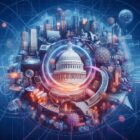5 Best Insights Into Policy Shifts Affecting ACA Enrollment

Want to know the top insights into policy shifts affecting ACA enrollment?
Brace yourself for the 5 best revelations that will shed light on the changes you need to be aware of.
From Open Enrollment Period modifications to the impact of Individual Mandate repeal, this article will provide an objective, analytical, and informative analysis of how these policy shifts are affecting enrollment.
Get ready to dive into the details and stay ahead of the game.
Key Takeaways
- Open enrollment period for ACA enrollment has been extended from November 1st to January 15th starting in 2022, providing individuals with more time to review options and make informed decisions.
- Expanded income brackets and adjusted subsidy calculations have made more people eligible for financial assistance, making ACA enrollment more accessible and affordable.
- The repeal of the individual mandate means individuals are no longer required to have health insurance, which may lead to a smaller pool of enrollees in the ACA marketplace and potentially higher premiums for those insured.
- Medicaid expansion has extended coverage to low-income adults, providing more opportunities for individuals to obtain health insurance through Medicaid and potentially enroll in the ACA. Studies have shown that Medicaid expansion leads to improved health outcomes for enrollees.
Open Enrollment Period Changes
You should be aware of the recent changes in the open enrollment period for ACA enrollment.
The open enrollment period is the time when individuals can sign up for health insurance coverage through the Affordable Care Act (ACA). In the past, the open enrollment period typically ran from November 1st to December 15th. However, there have been changes to this timeframe in recent years.
Starting in 2022, the open enrollment period for ACA enrollment will be extended. The new open enrollment period will begin on November 1st and run through January 15th. This extended timeframe allows individuals more time to review their options and make informed decisions about their health insurance coverage.
The decision to extend the open enrollment period was made in order to provide individuals with greater access to affordable health insurance. It allows for a longer period of time for individuals to consider their options and enroll in a plan that best meets their needs.
It is important to note that outside of the open enrollment period, individuals may still be able to enroll in ACA coverage if they qualify for a Special Enrollment Period. Examples of qualifying events include getting married, having a baby, or losing other health coverage.
Subsidy Eligibility Modifications
Subsidy eligibility modifications have been implemented to enhance accessibility and affordability of ACA enrollment. These changes aim to provide better financial assistance to individuals and families seeking health insurance coverage through the Affordable Care Act.
Here are three important modifications that can impact your subsidy eligibility:
- Expanded income brackets: The subsidy eligibility modifications have widened the income brackets, allowing more people to qualify for financial assistance. This means that individuals and families with slightly higher incomes may now be eligible for subsidies, making health insurance more affordable for a larger portion of the population.
- Adjusted subsidy calculation: The changes have also adjusted the way subsidies are calculated. Previously, subsidies were based on the cost of the second-lowest Silver plan in the marketplace. Now, subsidies are based on the cost of the lowest-priced Silver plan, making coverage more affordable for many individuals and families.
- Increased subsidy amounts: The modifications have increased the subsidy amounts available to those who qualify. This means that eligible individuals and families may receive more financial assistance, reducing their out-of-pocket costs for health insurance premiums.
These subsidy eligibility modifications are designed to make ACA enrollment more accessible and affordable for a wider range of individuals and families. By expanding income brackets, adjusting subsidy calculations, and increasing subsidy amounts, more people can now receive the financial help they need to obtain comprehensive health insurance coverage.
Impact of Individual Mandate Repeal
The impact of the repeal of the individual mandate can significantly affect your ACA enrollment. The individual mandate was a key provision of the Affordable Care Act (ACA) that required individuals to have health insurance coverage or pay a penalty.
The repeal of this mandate means that individuals are no longer required to have health insurance, which could lead to a decrease in ACA enrollment.
Without the individual mandate, some individuals may choose to forgo health insurance coverage, especially those who are healthy and don’t anticipate needing medical care. This could result in a smaller pool of enrollees in the ACA marketplace, potentially leading to higher premiums for those who remain insured.
Additionally, the repeal of the individual mandate could impact the stability of the insurance market. With fewer healthy individuals in the marketplace, insurers may face a higher proportion of individuals with pre-existing conditions, which could increase the cost of providing coverage.
It’s important to note that despite the repeal of the individual mandate, other provisions of the ACA, such as subsidies for low-income individuals, still remain in place. These subsidies can help make insurance more affordable for those who qualify.
Medicaid Expansion and Enrollment
Expanding Medicaid eligibility can significantly increase your chances of enrolling in the ACA. This is because Medicaid expansion allows for a broader range of individuals to qualify for Medicaid coverage, which in turn makes them eligible for ACA enrollment.
Here are three key points to consider regarding Medicaid expansion and enrollment:
- Increased Access to Coverage: Medicaid expansion extends coverage to low-income adults who may not have been eligible under previous guidelines. This means that more individuals have the opportunity to obtain health insurance through Medicaid and potentially enroll in the ACA.
- Reduced Financial Burden: Medicaid expansion can alleviate the financial burden of healthcare costs for those who qualify. With access to affordable coverage, individuals may be more inclined to enroll in the ACA and take advantage of the benefits it offers.
- Improved Health Outcomes: Studies have shown that Medicaid expansion leads to improved health outcomes for enrollees. By expanding Medicaid eligibility, more individuals can access preventive care, screenings, and necessary treatments, which can lead to better overall health outcomes and potentially increase ACA enrollment.
Understanding the impact of Medicaid expansion on ACA enrollment is crucial. It highlights the importance of policies that promote access to affordable healthcare and can serve as a stepping stone to discussing the effects of policy uncertainty on enrollment.
Effects of Policy Uncertainty on Enrollment
If you qualify for Medicaid expansion, policy uncertainty can impact your decision to enroll in the ACA. The constantly changing policies surrounding the Affordable Care Act (ACA) can cause confusion and hesitation for individuals considering enrolling in the program. Uncertainty about the future of the ACA, including potential changes to coverage and benefits, can lead to skepticism and a lack of trust in the system. This uncertainty may deter individuals from enrolling in the ACA, even if they’re eligible for Medicaid expansion.
Policy uncertainty can have a direct impact on enrollment numbers. Research has shown that during periods of policy uncertainty, enrollment in the ACA decreases. This is particularly true for individuals who are eligible for Medicaid expansion, as they may be more sensitive to changes in policy and benefits. Additionally, policy uncertainty can create confusion about eligibility criteria, causing individuals to question whether they qualify for the program.
The effects of policy uncertainty on enrollment aren’t limited to individuals who qualify for Medicaid expansion. Even those who don’t qualify may be hesitant to enroll due to uncertainty about the future of the ACA. This can result in lower overall enrollment numbers and may have implications for the stability and sustainability of the ACA marketplace.
Frequently Asked Questions
How Will the Changes in the Open Enrollment Period Affect Individuals Who Are Currently Enrolled in an ACA Plan?
The changes in the open enrollment period may affect you if you are currently enrolled in an ACA plan. It is important to stay informed about these policy shifts and how they may impact your coverage.
What Specific Modifications Have Been Made to the Subsidy Eligibility Criteria and How Will This Impact Individuals Who Rely on Financial Assistance to Afford Health Insurance?
The specific modifications to the subsidy eligibility criteria have changed. This will impact individuals who rely on financial assistance to afford health insurance.
With the Individual Mandate Repealed, What Are the Projected Consequences for the Overall Number of People Enrolling in ACA Plans?
Without the individual mandate, the projected consequences for ACA enrollment are a decrease in the overall number of people enrolling in plans. This change could have significant implications for the stability and affordability of the ACA marketplace.
How Have the Changes in Medicaid Expansion Policies Impacted the Number of Individuals Eligible for Enrollment in the Program?
The changes in Medicaid expansion policies have impacted the number of individuals eligible for enrollment in the program. Findings show that these changes have resulted in a decrease in the number of eligible individuals.
How Has the Policy Uncertainty Surrounding the ACA Affected People’s Decision to Enroll or Renew Their Coverage?
The policy uncertainty surrounding the ACA has greatly impacted your decision to enroll or renew coverage. With constant changes and lack of clarity, it’s understandable that you may hesitate or feel unsure about your options.



